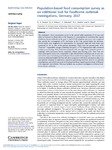Population-based food consumption survey as an additional tool for foodborne outbreak investigations, Germany, 2017
Rosner, Bettina M.
Meinen, Anika
Schmich, Patrick
Zeisler, Marie-Luise
Stark, Klaus
We conducted a food consumption survey in the general adult population of 18 years and older in Germany to obtain data on the frequency of consumption of food items that caused foodborne disease outbreaks in the past. A total of 1010 telephone interviews were completed that queried the consumption of 95 food items in the 7-day period before the interview. Survey results were weighted to be representative. Six exemplary ‘high risk’ food items were consumed by 6% to 16% of the general population. These were raw ground pork: 6.5%; ‘Teewurst’ (=spreadable sausage-containing raw pork): 15.7%; unpasteurised milk consumed without prior heating: 9.0%; food items prepared with raw eggs: 9.8%; unheated sprouts or seedlings: 8.8% and frozen berries consumed without prior heating: 6.2%. Data from our food consumption survey were comparable to data obtained from control persons in case-control studies conducted during past foodborne disease outbreak investigations. We consider our survey an additional helpful tool that will allow comparison with food consumption data from case-patients obtained in exploratory, hypothesis-generating interviews early on in outbreak investigations, and which may assist in forming hypotheses regarding associations of illnesses with suspected food vehicles. This may facilitate and accelerate investigations of future foodborne disease outbreaks.

